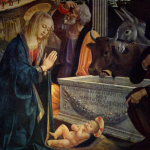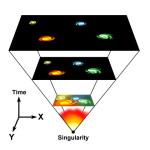Hell and God’s Goodness
by Dr. Dennis Bonnette
Filed under Hell

Although this article will address the content of certain theological doctrines, it is written from a purely philosophical perspective. This is the same method used consistently in my book, Origin of the Human Species, in which I examine how evolutionary theory comports with divine revelation and philosophy. What characterizes philosophical analysis of theological doctrine is that reason alone is the method employed. Thus, while the philosopher as such cannot say whether the Trinity is factual, he can still examine whether it appears rationally possible.
The Scandalous Problem
Here I will examine the theological doctrine of hell to see whether it is compatible with the God of classical theism, who is claimed to be all good, all loving, and all merciful.
Many skeptics seem to think it is obvious that an all good and loving God could not possibly consign a fallible human being to the unimaginable, interminable, excruciating pain of physical fire and other torments in the form of punishment known as hell – a sanction for sin from which there is no appeal and no hope of future release. Surely, no good God and no compassionate human being could possibly even contemplate such unmerciful treatment of a human soul, merely because she made errors of choice during a single short lifetime.
One Aspect of the Solution
I do not intend to address every possible solution to this specific variation of the well-known problem of evil – a topic I have dealt with in more general terms elsewhere. Among possible solutions, it is argued that God permits evils, including physical suffering, for some greater good, which the human mind cannot grasp. Since metaphysics proves that God is all good, it necessarily follows that any evil found in the world cannot be his fault. Perhaps, the misuse of free will by certain creatures (angelic or human) has led to the introduction of evils unintended by God. Perhaps, man’s misuse of free will calls forth from divine retributive justice a punishment which seems severe, but which must be measured in terms of the infinite goodness which grievous sins offend – thus requiring the eternal pains of hell as a just punishment.
Pointedly, since God is the transcendent Law Giver, he is not bound by the natural laws that apply to creatures. Rather, it belongs exclusively to him to administer retributive justice to those who violate his laws – natural and divine. This means that it is good that God punish the wicked as part of his overall plan of creating and governing a good and just world.
But Why the Pains of Hell?
Still, I focus here on the specific question posed by some skeptics as to why an all good God would submit departed souls to eternal physical pain and suffering, even in its most agonizing form of physical fire?
Certainly, it appears at first glance that such suffering is nothing but an act of pure vengeance on the part of God. Indeed, does not Scripture declare, “Revenge is mine, I will repay, saith the Lord”1? But, how can revenge be reconciled with the concept of a loving God?
Yet, while revenge is not an act permitted to mere mortals, it does have a legitimate meaning properly reserved to God as the ultimate administrator of retributive justice. Retributive justice is not just “getting back” at someone, but the restoration of the proper order of things – an order in which each person gets exactly what he deserves, including proper punishment for his evil deeds. Moreover, it must be understood that this right belongs in its highest instance to God alone as creator and supreme lawgiver.
Should such retributive justice include the fire of hell? And, if so, how can this be reconciled with the belief that God is all good and loving and merciful?
The Specific Solution
Most skeptics’ accusations against the punishments of hell are made on the supposition that even the Christian understanding of creation does not justify such eternal sufferings.
I will show that this divine retribution is consistent with the general order of creation presented in Christian sources as well as with the infinite goodness, justice, and mercy of the God of classical theism.
Among the central doctrines of Christianity is that man’s last end – the ultimate purpose of his very being – is to be united with God for all eternity in a face to face encounter with the divine being, what Catholics call the Beatific Vision.
But, in this present life, we do not enjoy the Beatific Vision. Does that mean that we are already in hell? Well, yes and no. Yes, in the sense that we are presently lacking the ultimate end of God’s intention in creating our nature. But, more importantly, we are not now in hell, in the sense that this is neither a punishment nor necessarily an eternal condition.
The essential meaning of hell is (1) that we finally understand fully that the Beatific Vision is the sole reason for our creation as human beings and the sole thing fully worth accomplishing in our existence, (2) to know that this end will for all eternity be denied to us, and (3) to know that this ultimate failure of our existential purpose is totally and completely our own fault and no one else’s.
All this being the case, why does not God simply punish bad lives by letting us merely fail to accomplish our intended final bliss in exactly the manner just described? Why is the threat of extreme physical punishment seemingly arbitrarily and capriciously attached to this natural spiritual sanction for a wicked life?
Man is a Rational Animal
Man’s uniqueness is that his spiritual, rational soul is embodied in an animal nature. Being an animal means that our nature is that of a sentient organism. We have senses. Our sensitive appetites help us achieve the good of the individual and of the species by making us seek sensible goods and avoid sensible evils. The natural good that accompanies attaining the sensible good is pleasure. The natural evil that accompanies experiencing sensible evil is pain. Thus, we are strongly motivated to seek pleasure and avoid pain.
It is not merely man’s spiritual soul that is aimed at his last end, but rather it is his whole human nature – spirit and matter, soul and body – that either attains his last end or fails to attain it through his own fault.
For this reason, we should not be surprised to discover an important role is played by bodily sense knowledge with respect to how and whether man reaches his last end, the Vision of God.
If we believed that missing our last end meant merely never seeing God in his very essence – never having the Beatific Vision, that might not be a sufficient reason for many people to lead virtuous lives. Such a “purely spiritual” motivation might not move us the way that we, like other animals, can be intensely motivated by desire for pleasure and, even more so, fear of agonizing pain!
Many would say that they do not presently miss God’s presence all that much in this life anyway, so why worry about missing him permanently in the next? In truth, we are not moved decisively in this present life toward God in all our choices -- despite many of us knowing, in theory at least, that he is the highest good.
In a word, to many people in this life, if all they thought the end of life entailed was attainment of the Vision of God, they might well be inclined to forgo that final destiny, since they would easily not value it as much as the earthly pleasures they know would never lead them to such alleged heavenly bliss!
But God made man to fear physical pain – and properly so, since it moves us to avoid dangers to our well-being both as individuals and for the sake of our species’ survival.
Therefore, it makes eminent sense that God would use man’s intense fear of great pain to motivate him to reach his last end. Once in the next life, man will clearly know the value of the spiritual reward of the Beatific Vision. Those who fail to attain that true last end through their own fault will then have the appalling realization of failing to attain the very purpose of their existence. But, in this life, the intensity of most human beings’ motivation is focused on sensible rewards and punishments, on pleasure and pain.
Thus, the realistic possibility of knowing that we may fall through grave sin into an eternal pit of most intense physical pain would be, for most mortal men, the strongest possible motivation to live an essentially good life – a life best ordered to avoiding the physical suffering of eternal damnation.
God's Love
Is letting sinners go to hell then truly an act of simple retributive justice on the part of God? Is God seeking merely to punish their moral evil by allowing them to fall into the pits of hell?
On the contrary, it is the greatest act of love on God’s part to make certain that men are motivated as strongly as possible to seek and attain what is, in truth and in fact, the greatest possible happiness -- the eternal Beatific Vision.
In other words, we humans do not properly value what will make us happiest in the long run, and thus, through our own craven ignorance of proper goods, fail to attain the perfect bliss God wills for all men in his act of creating them. Hence, God makes certain that we are properly motivated to seek our true and most perfect end, by graphically placing before us the sensible horror that confronts those who willfully fail to attain their proper last end.
But Most People Don't Even Believe in Hell!
That is quite true. And, even among those who should do so – based on their religion’s public doctrines, a large number do not believe in hell’s physical reality. Of the roughly 7.6 billion people on Earth as of 2018, about 55% belong to Judaism, Christianity, or Islam – all of which religions have some real notion of hell. That makes for some four billion people. If even half of this total take the torments of hell seriously, as probably do, that makes a total of about two billion people – or roughly a quarter of the world’s population – that believes in the real pains of hell.
Therefore, a good portion of humanity is motivated by the physical pains of hell to seek salvation seriously. Fear of hell can well be the beginning motivation that leads one to those religious practices, which, in turn, may lead to a more mature and deeper appreciation that one’s highest motivation should be, not fear of hell, but love of God because of his infinite goodness and perfection.
St. Thomas makes much the same point: “From becoming accustomed to avoid evil and fulfill what is good, on account of the fear of punishment, one is sometimes led on to do so likewise, with delight and of one's own accord. Accordingly, the law, even through punishing, leads men to being good.” (Summa Theologiae, I-II, q. 92, a. 2, ad 4.)2
Thus, the fear of hell may set one on a path leading to virtuous living for its own sake. This, in turn, can lead to the true understanding that union with God is the essence of heaven and our proper last end.
While eternal life for the inhabitants of paradise in Islam is usually associated with sensual pleasures, Islamic teaching also affirms that “the most acceptable of them with God shall look upon His face night and morning.” (Al-Qiyama 75:22,23)
In other words, for at least a quarter of mankind, belief in a literal physical hell serves the purpose of leading men in the direction of virtuous living. The net effect of this motivation toward salvation would naturally also lead many to understand the true value of our last end as being the Vision of God. From this would naturally also result an increasing number of souls seeking to please God by living more and more holy lives, that is, to achieve genuine sanctity.
Thus, if one wonders why God would make the torments of hell central to the beliefs of what is, de facto, only, perhaps, a quarter of mankind today, the answer might just be that God is actually concerned with the spiritual quality of human perfection. That is, God may be concerned not merely with the quantity of the saved, but also with the qualitative perfection to be found among those who are saved.
Oddly enough, while beliefs about the eternal torments of hell are used by skeptics as reason to disbelieve in God’s goodness, those same beliefs may motivate far greater numbers of souls to follow an upward journey of religious understanding that leads them eventually to the most holy religious insights and practice, that is, to sanctity itself.
In a word, the doctrine of hell creates a world designed to produce the greatest of saints – a qualitatively more perfect end than might otherwise be possible without hell. It is perfectly within the prerogative of God to design his creation so as to produce the most spiritually perfect creatures. Since the fear of hell, a hell which is licit in itself as a form of divine retributive justice, can serve as a licit means to that more perfect end, it is fully justified.
The Doctrine of Hell and Free Will
The Catholic Church dogmatically defines that those who die in a personal grievous sin descend immediately into hell3 and that the punishment of hell lasts for all eternity.4 Nonetheless, while the majority of traditional theologians do believe hell to entail a physical fire, it also remains true that the Church has never condemned the speculation that hell’s “fire” is constituted of purely spiritual pain, such as exclusion from the Beatific Vision and the pangs of conscience.5
Moreover, the Catechism of the Catholic Church declares that this “exclusion” from the Beatific Vision is essentially a form of “self-exclusion.”6 Such self-exclusion is expressed by Lucifer in Milton’s Paradise Lost, when he proclaims, “Better to reign in hell than to serve in heaven.” It is a measure of final obstinacy and pride that refuses to abandon serious sin and accept divine forgiveness.
It is true that the rational appetite, or will, must always choose the good. But does that mean that no free person in full possession of his faculties could refuse the highest good, God himself, so as to “self-exclude” himself from heaven and go to hell as a result?
This question reveals a basic misunderstanding of the nature of the rational appetite or free will. The good is defined as being as desirable. So, the rational appetite naturally desires every possible good. That is to say, the will is necessitated to seek the universal good or happiness. But the human will does not desire any particular good – no concrete good or action – necessarily in this life, since particular goods are good under one aspect, but not under another.7
Finite goods can always be refused, since there are elements of imperfection about them which may be possessed by some other goods. Hence, we choose between various goods, like chocolates in a box, where each has qualities lacked by others and vice versa – thereby, forcing us to choose between them.
But with regard to direct knowledge of God in his essence, St. Thomas Aquinas concludes that “the will of him who sees God in his essence of necessity adheres to God, just as now we desire of necessity to be happy.”8 (Summa Theologiae, I, q. 82, a. 2, c.)
God is known in his essence solely in the Beatific Vision. Yet, it is self-evident that the final refusal or acceptance of God must take place before God is embraced fully or rejected completely. Hence, God is not known in his very essence before the soul reaches heaven. What the soul knows before that time must then be some finite good, such as knowing the truth that God is the highest good. But, any finite good can be refused.
The problem is that we often choose lesser and improper goods even when we know that they are opposed to God’s law or to God himself – or even to our own true good! In fact, the very basis of our experience of free will is the fact that we can choose between various finite goods and even choose sinful goods that we know are opposed to the true good, or even the goodness of God himself!
Unfortunately, this is precisely why a hardened sinner, who still has essential possession of his rational faculties, can freely exclude himself from heaven by stubbornly rejecting the law of God or even some finite representation of divine majesty and love -- even on his deathbed.
How Many Are Lost?
But how many people actually go to hell? On that question, the closest the official Magisterium comes to offering an answer is found in the encyclical by Pope Benedict XVI, Spe Salvi, in which he suggests that, while a few souls go directly to heaven and a few go directly to hell, the “great majority of people” go to a place of temporary purification before entering the Vision of God, the place Catholics call “purgatory.”9
Curiously, even Islamic writings seem to have some notion of limited duration of punishment in hell, a concept similar to the Catholic conception of purgatory. Indeed, one optimistic text proclaims that almost all people will be removed from this state of suffering: “From every one thousand, take out nine-hundred-and ninety-nine.” (Bukhari 4:567)
Since there is no way to be certain just how many, if any, souls actually go to hell, it is also possible that those who – through no fault of their own – are ignorant of its existence, may find themselves more likely to end up in some form of purgatory, rather than hell itself.
Conclusion
On careful reflection, the notion of hell as a place of eternal punishment for the souls of the wicked after death turns out to be (1) a just application of retributive justice by a Divine Lawgiver who stands ontologically above the natural law of his creation, (2) a natural sanction that is actually self-imposed by a will stubbornly opposed to the righteous laws of Infinite Goodness, and (3) a powerful tool designed to use the natural avoidance of pain – both spiritual and physical – as a motive to follow God’s laws and prepare souls for a spiritual ascendancy leading to the direct vision of God himself, which is man’s perfect happiness.
Hell, then, is not something evil in itself, but a natural byproduct of the order of being, one which aids in bringing many human beings to the highest state of natural – or even supernatural – perfection through holiness of life. God’s divine providence aims to produce the happiest creatures possible.
Related Posts
Notes:
- Romans 12:19 (Douay-Rheims) ↩
- "Ad quartum dicendum quod per hoc quod aliquis incipit assuefieri ad vitandum mala et ad implendum bona propter metum poenae, perducitur quandoque ad hoc quod delectabiliter et ex propria voluntate hoc faciat. Et secundum hoc, lex etiam puniendo perducit ad hoc quod homines sint boni." Editio Leonina. ↩
- Solemn declaration by Pope Benedict XII in the Dogmatic Constitution, “Benedictus Deus.” Denz. 531. ↩
- The Caput Firmiter of the Fourth Lateran Council. Denz. 429. ↩
- Ludwig Ott, Fundamentals of Catholic Dogma -- sixth edition (B. Herder Book Company, 1964), 480-481. ↩
- Catechism of the Catholic Church, 1033. ↩
- /Bro. Benignus Gerrity, Nature, Knowledge, and God (Bruce Publishing Company, 1947), 244-245. ↩
- “Sed voluntas videntis Deum per essentiam, de necessitate inhaeret Deo, sicut nunc ex necessitate volumus esse beati.” Editio Leonina. ↩
- Spe Salvi (2007), nn. 45-46. ↩
Note: Our goal is to cultivate serious and respectful dialogue. While it's OK to disagree—even encouraged!—any snarky, offensive, or off-topic comments will be deleted. Before commenting please read the Commenting Rules and Tips. If you're having trouble commenting, read the Commenting Instructions.












